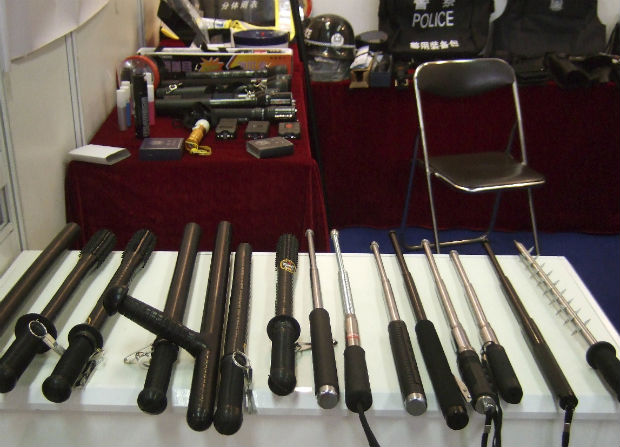Amnesty blasts China’s torture tool industry

In this undated photo supplied by Amnesty International, side handled and telescopic batons and spike batons are displayed at a police equipment exhibition, at an undisclosed location. Chinese production and export of police equipment primarily used for torture, such as electric shock wands and neck-and-wrist cuffs connected by a chain, has grown dramatically, enabling human rights violations at home and abroad, Amnesty International said in a report Tuesday, Sept. 23, 2014. AP/Amnesty International
BEIJING — Chinese production and export of police equipment primarily used for torture, such as electric shock wands and neck-and-wrist cuffs connected by a chain, has grown dramatically, enabling human rights violations at home and abroad, Amnesty International said in a report Tuesday.
More than 130 Chinese companies, up from 28 about a decade ago, are now engaged in the development, production and export of law enforcement tools, most of which are legitimate, but many of which are inherently cruel and inhumane, the London-based human rights group said.
The 38-page report also cited as examples spiked batons and restraint chairs with a desk-like surface in front where arms can be shackled, often with ankle cuffs beneath that force detainees into painful contortions.
“There is no excuse whatsoever for allowing the manufacturing and trade in equipment for which the primary purpose is to torture or inflict cruel, inhuman or degrading treatment on people,” Patrick Wilcken, security trade and human rights researcher at Amnesty International, said in a statement.
China explicitly bans torture and mistreatment of inmates, and it strongly denies widespread allegations that torture is often used by Chinese police and Communist Party investigators. Earlier this year, Zhao Chunguang, a national official overseeing police detention facilities, said there had not been a single case of torture used to coerce a confession at any detention center throughout China for the past five years.
Article continues after this advertisementAmnesty says it has documented a wide range of physical torture in China, including the use of electric shock batons.
Article continues after this advertisementAnd on Monday, the Xinhua News agency reported that a court in northeastern China had convicted three police officers and four other non-police officers of torturing suspects and killing one person. One victim said he was restrained to an iron chair while being prodded with an electric shock baton, Xinhua said.
Amnesty urged China in the report to ban the production and export of several of the kinds of equipment it says are torture tools or inherently cruel, especially to countries with poor human rights records. It said the tools are being shipped to Cambodia, Nepal, Congo, Egypt, Ghana, Madagascar, Senegal and Uganda.
The report doesn’t provide an estimate on the industry’s size in China or its rate of growth, citing a lack of transparency in market data. But Wilckens said that Amnesty believes the industry has grown and flourished given the proliferation of companies, increased presence of Chinese manufacturers of policing equipment at international trade fairs, earnings reports from some manufacturers’ factories, and lists of export destination countries.
Faced with rising social tensions, China has been pumping more money to maintain social orders. Its annual budget for domestic security skyrocketed over the past decade to 760 billion yuan ($125 billion), higher than its defense budget last year.
The Public Security Ministry did not respond to requests for comment.
Amnesty also called on Beijing to investigate alleged incidents of abuse of the police tools domestically, and to strengthen regulations on the use of legitimate but easily misused policing tools such as tear gas and iron batons used to break up public protests and riots.
The report, jointly compiled with U.K.-based Omega Research Foundation, which specializes in research on military, security and police equipment, said that Chinese-made rigid restraint chairs “have no legitimate law enforcement use” and that the U.N. Committee against Torture has recommended they be abolished.
It says China is the only country known to produce spiked police batons, and notes that at least seven Chinese companies openly advertise them for export. The neck-and-wrist chain-cuffs can endanger one’s life by restricting breathing, blood circulation and nerve communication.
Omega found 96 Chinese companies making or selling abroad electric shock stun weapons, which apply electrical shock directly to an individual. The report says they can be abused as a torture tool when applied to sensitive body parts.
Calls to one of the companies that makes electric-shock wands, Anhua Police Equipment Manufacturing Co., in eastern Jiangsu province, were referred to a senior manager who identified himself only by his surname Ma. He decline to answer questions from a foreign media outlet.
“We are at the service of the Chinese government, so I cannot answer you,” Ma said. “I think China has pretty good human rights records, and I suggest those countries finding issues with China’s human rights records look at themselves first.”
A woman who answered the phone at Yuanda Industrial and Trade Co., which makes restraint chairs and neck-and-wrist cuffs, said the company was only producing what the government has approved and is not responsible for any wrongdoing.
“We have the approval permit from the Public Security Ministry. We cannot just simply produce whatsoever we want to make,” she said and quickly hung up.
The report said Chinese-manufactured electric-shock batons had been carried by police Ghana, Senegal, Egypt and Madagascar. It said spiked batons had been exported to Cambodia, Nepal and Thailand and used by police in Cambodia.
“China’s flawed export system has allowed the trade in torture and repression to prosper,” Amnesty’s Wilcken said. “There is an urgent need for the Chinese authorities to fundamentally reform its trade regulations to end the irresponsible transfer of law enforcement equipment to agencies who will likely use it to violate human rights.”